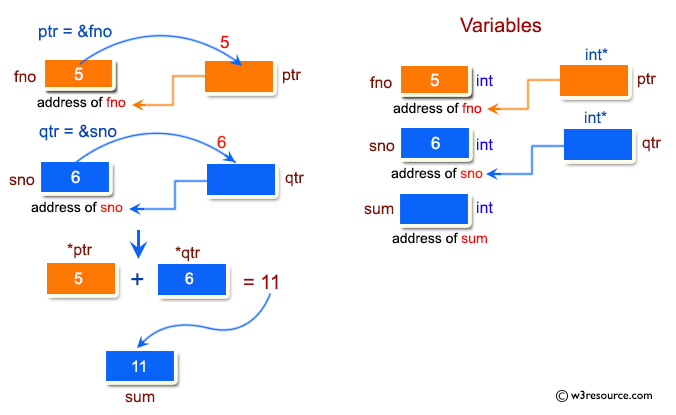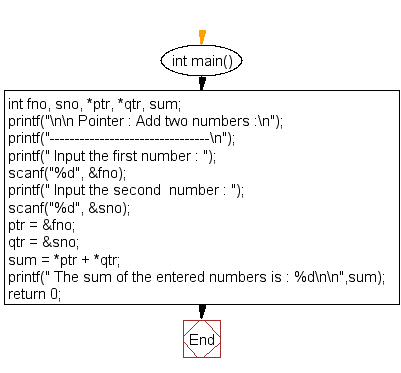C Exercises: Add two numbers
C Pointer : Exercise-4 with Solution
Write a program in C to add two numbers using pointers.
Pictorial Presentation:

Sample Solution:
C Code:
#include <stdio.h>
int main()
{
int fno, sno, *ptr, *qtr, sum;
printf("\n\n Pointer : Add two numbers :\n");
printf("--------------------------------\n");
printf(" Input the first number : ");
scanf("%d", &fno);
printf(" Input the second number : ");
scanf("%d", &sno);
ptr = &fno;
qtr = &sno;
sum = *ptr + *qtr;
printf(" The sum of the entered numbers is : %d\n\n",sum);
return 0;
}
Sample Output:
Pointer : Add two numbers : -------------------------------- Input the first number : 5 Input the second number : 6 The sum of the entered numbers is : 11
Flowchart:

C Programming Code Editor:
Have another way to solve this solution? Contribute your code (and comments) through Disqus.
Previous: Write a program in C to demonstrate the use of &(address of) and *(value at address) operator.
Next: Write a program in C to add numbers using call by reference.
What is the difficulty level of this exercise?
Test your Programming skills with w3resource's quiz.
C Programming: Tips of the Day
Static variable inside of a function in C
The scope of variable is where the variable name can be seen. Here, x is visible only inside function foo().
The lifetime of a variable is the period over which it exists. If x were defined without the keyword static, the lifetime would be from the entry into foo() to the return from foo(); so it would be re-initialized to 5 on every call.
The keyword static acts to extend the lifetime of a variable to the lifetime of the programme; e.g. initialization occurs once and once only and then the variable retains its value - whatever it has come to be - over all future calls to foo().
Ref : https://bit.ly/3fOq7XP
- New Content published on w3resource:
- HTML-CSS Practical: Exercises, Practice, Solution
- Java Regular Expression: Exercises, Practice, Solution
- Scala Programming Exercises, Practice, Solution
- Python Itertools exercises
- Python Numpy exercises
- Python GeoPy Package exercises
- Python Pandas exercises
- Python nltk exercises
- Python BeautifulSoup exercises
- Form Template
- Composer - PHP Package Manager
- PHPUnit - PHP Testing
- Laravel - PHP Framework
- Angular - JavaScript Framework
- Vue - JavaScript Framework
- Jest - JavaScript Testing Framework
